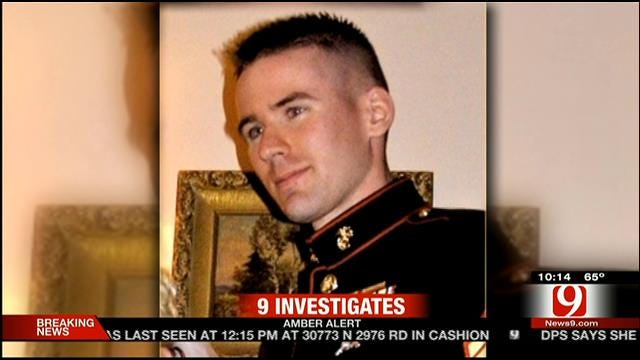The Suicide Epidemic Among US Soldiers
Oklahoma military leaders are calling it an epidemic.The lives of more than a hundred Oklahoma soldiers were cut short last year alone -- not by fighting, but rather by suicide.Thursday, July 17th 2014, 10:01 pm
By:
News 9
Oklahoma military leaders are calling it an epidemic.
The lives of more than a hundred Oklahoma soldiers were cut short last year alone -- not by fighting, but rather by suicide.
Nationally, 22 veterans take their lives every day.
It's an agonizing and difficult issue, and, sadly, one that too many Oklahoma mothers and fathers have had to confront head-on.
"Daniel and I talked openly and in depth about suicide," said Mary Ligon, whose son, Daniel, a United States Marine, was struggling.
"He had a lot of conflicted emotions," Ligon stated.
Two tours in Iraq had taken their toll on her son.
"He came back, especially the second time," said Ligon, haltingly. "He was disturbed, he really was disturbed."
Mary Ligon said she did all a loving mother could do. She tried to understand Daniel's pain, and when that didn't help, she urged him to get counseling.
She said Daniel was worried how that would look on his record.
"It was eight months after Daniel was discharged that we had a phone call," explained Ligon, her voice trailing off. "He had finally lost that battle."
Military and mental health experts acknowledge that soldiers have always had to deal with the physical and mental after-effects of combat. Post-Traumatic Stress Disorder is not new to this current generation of combatants.
What they say has changed, however, is that soldiers fighting the War on Terror are typically deployed multiple times. What's more, during those deployments, they become hyper-vigilant, as a result of always having to watching out for threats that didn't exist in previous conflicts -- roadside bombs, suicide bombers, snipers and more.
"My family tried to reach out to me," said Jason Burch, also a former Marine, "but, it was like, what do you say to them when they ask what's wrong with you?"
Burch is now an Oklahoma state trooper, but he remembers keenly how difficult it was for him, after 22 months in Iraq and Afghanistan, to switch off that vigilance and fall back into normal routines and behavior once he was back home.
"I felt like nobody understood me," said Burch. "I was angry, to the point of-- I was combative."
Burch said the frustration and the feeling of isolation made him, not suicidal, but close.
"I could've gotten myself into a situation where a law enforcement officer would have been forced to kill me," Burch admitted.
The Oklahoma Highway Patrol employs numerous veterans, about 20 percent, in fact.
Chief Rick Adams was in the National Guard for years.
"Most folks come back, and they don't really have an issue reintegrating into society," Adams noted, "but some do."
Adams made the decision last year, for the well-being of both the Highway Patrol and its troopers, OHP needed to do something to help its veterans reintegrate.
"How do you handle stress?" Trooper Josh Byrd asked a group of troopers seated in front of him.
Byrd still serves with the National Guard, as a chaplain. Chief Adams asked him to set up a program.
"The biggest thing is these guys who are needing help need to know there are people out there that are willing to help, veterans out there who are willing to help," Byrd explained.
Byrd knows about needing help. He had his own problems reintegrating and "switching off" the hyper-vigilance.
"I couldn't go to a buffet line, because people were around me, people walking behind me, and so I had to sit in a corner so I could watch everybody," said Byrd. "Because in my mind, I'm still looking for the guy with the gun, still looking for the roadside bomb. I'm still looking for the threat."
At his family's urging, Byrd got help, and now he's doing what he can to make sure veterans employed by OHP know about the services that are available to them.
The military does brief soldiers when they first come home, but Byrd said most are too anxious to see their families to pay attention.
"So, whenever they say, 'Do you need help?' we want to check the box and say 'No, I'm good to go,'" Byrd said.
That is, in fact, exactly what Jason Burch did.
"You just want out of there as fast as you can," recalled Trooper Burch. "So, it's like everything they tell you goes in one ear and out the other."
After a family intervention, Burch also went for counseling. He says getting to talk with other veterans about what was bothering him was the key.
"They understood, and they didn't judge, and they didn't look at me like I was crazy," Burch said.
Mary Ligon will never know if that sort of interaction and counseling would have saved her son Daniel, but she does know that it's working for other veterans who are facing similar demons, waking up in the morning and hoping they can survive another day.
"And that's where too many of our troops are," lamented Ligon, "just trying to get through one more day."
After her son's death, Ligon founded Coffee Bunker in Tulsa. The whole idea, she said, was to create a safe and consistent place for veterans to unwind and open up. Coffee Bunker is currently undergoing a remodel and expansion.
Meanwhile, the Highway Patrol is working to expand its program with plans to offer Trooper Byrd's reintegration program to veterans who work with other law enforcement agencies.
Military officials encourage anyone who needs help or knows someone who needs help to call the National Suicide Prevention Lifeline at 1-800-273-TALK.
More Like This
July 17th, 2014
March 22nd, 2024
March 14th, 2024
February 9th, 2024
Top Headlines
April 24th, 2024
April 24th, 2024
April 24th, 2024













